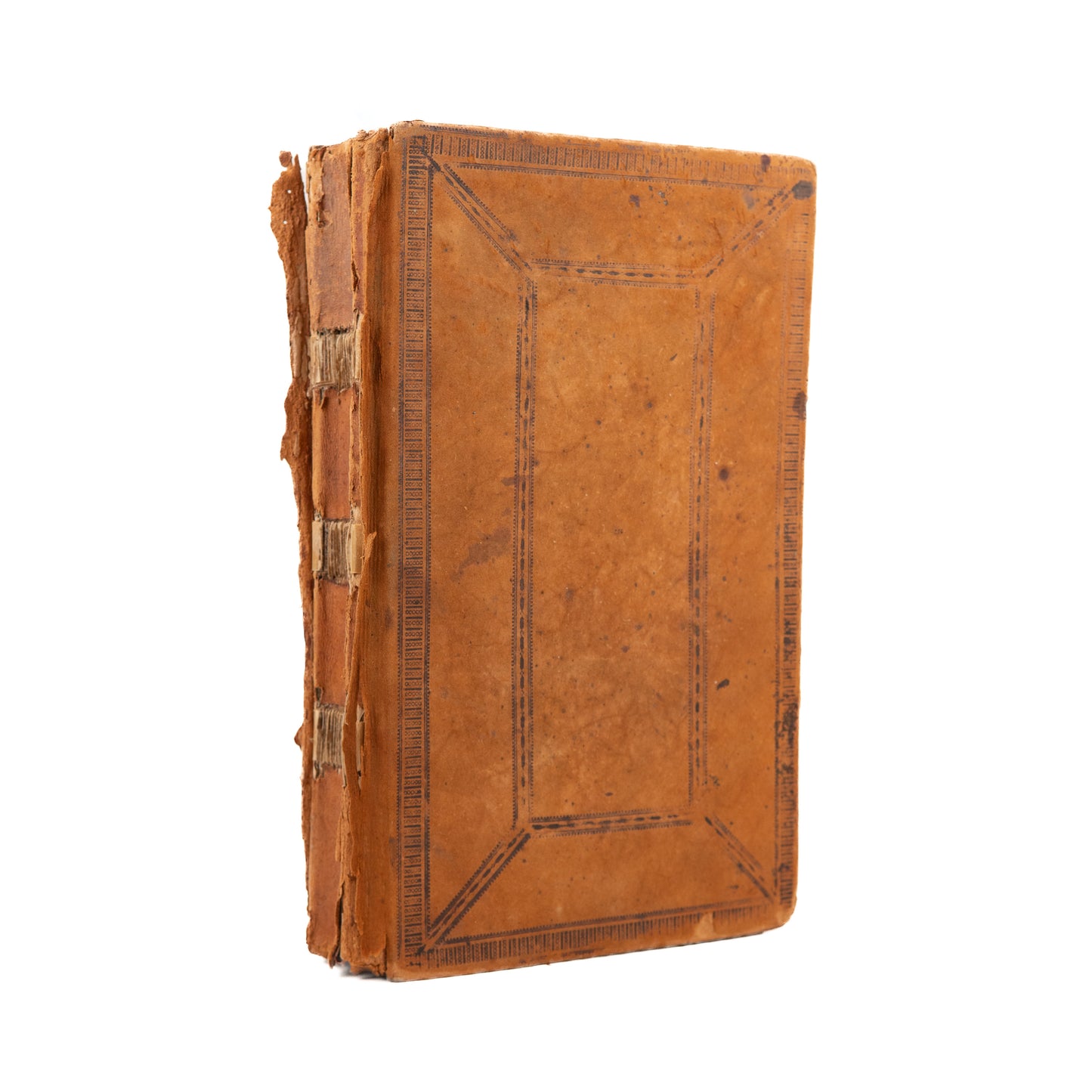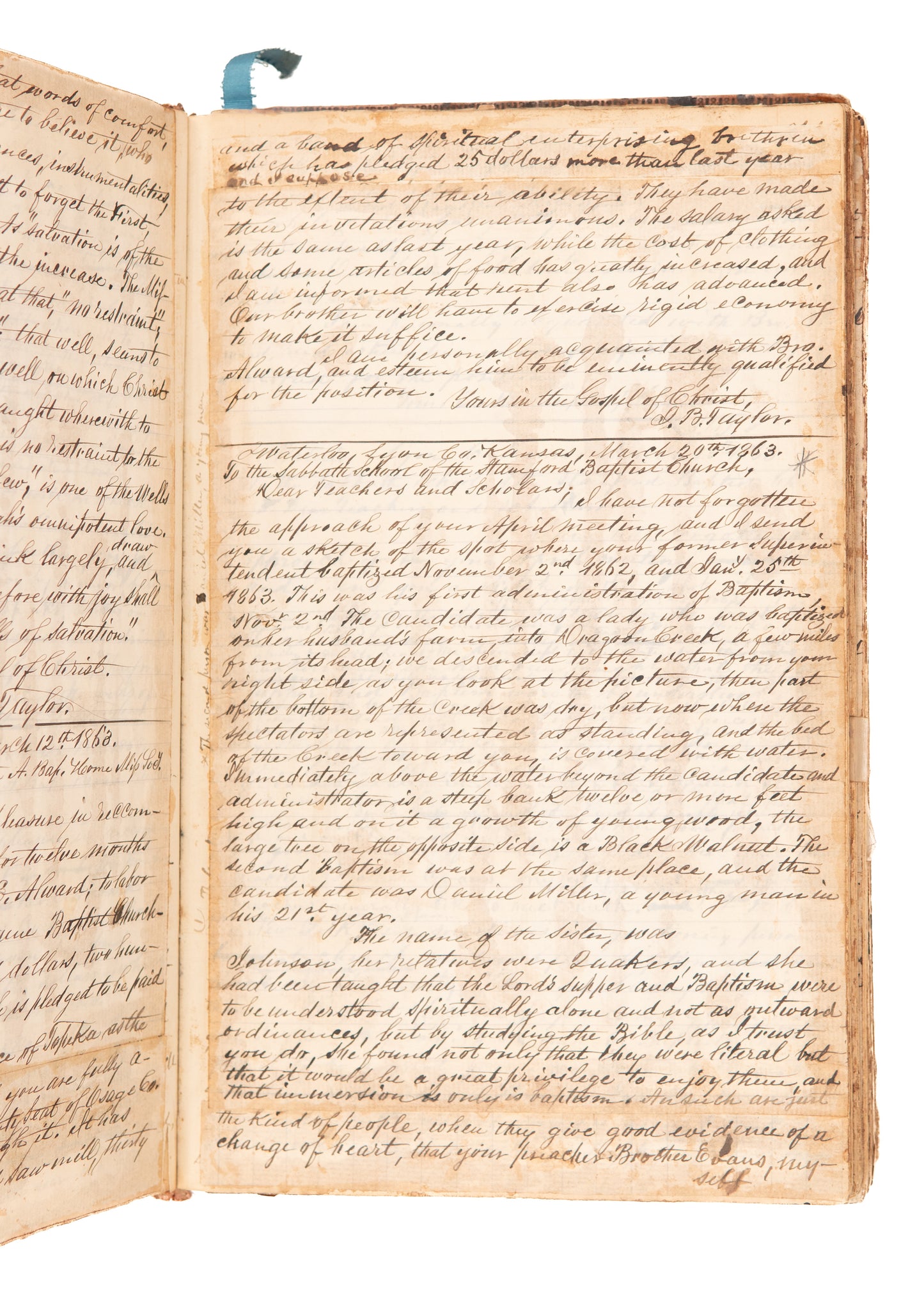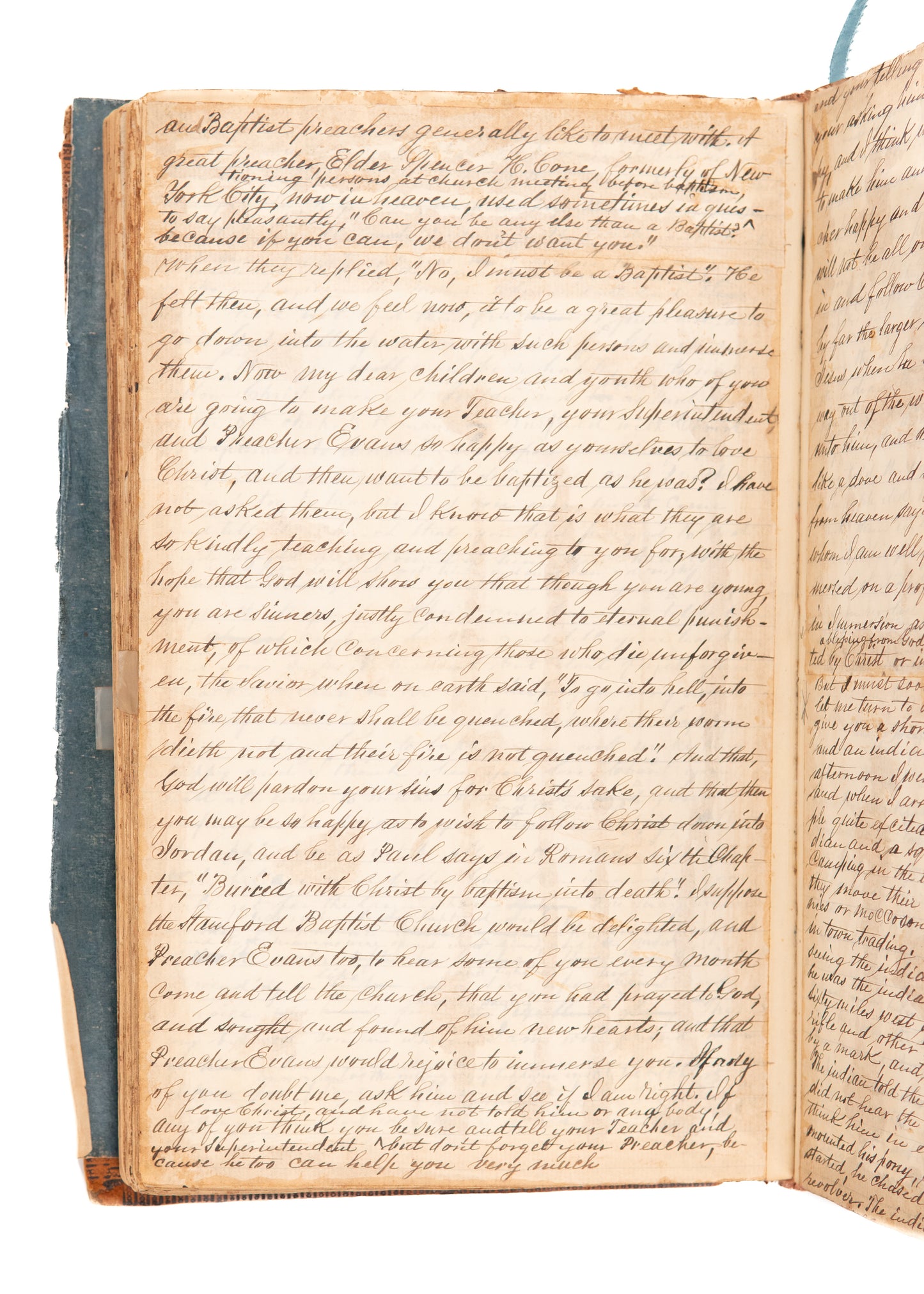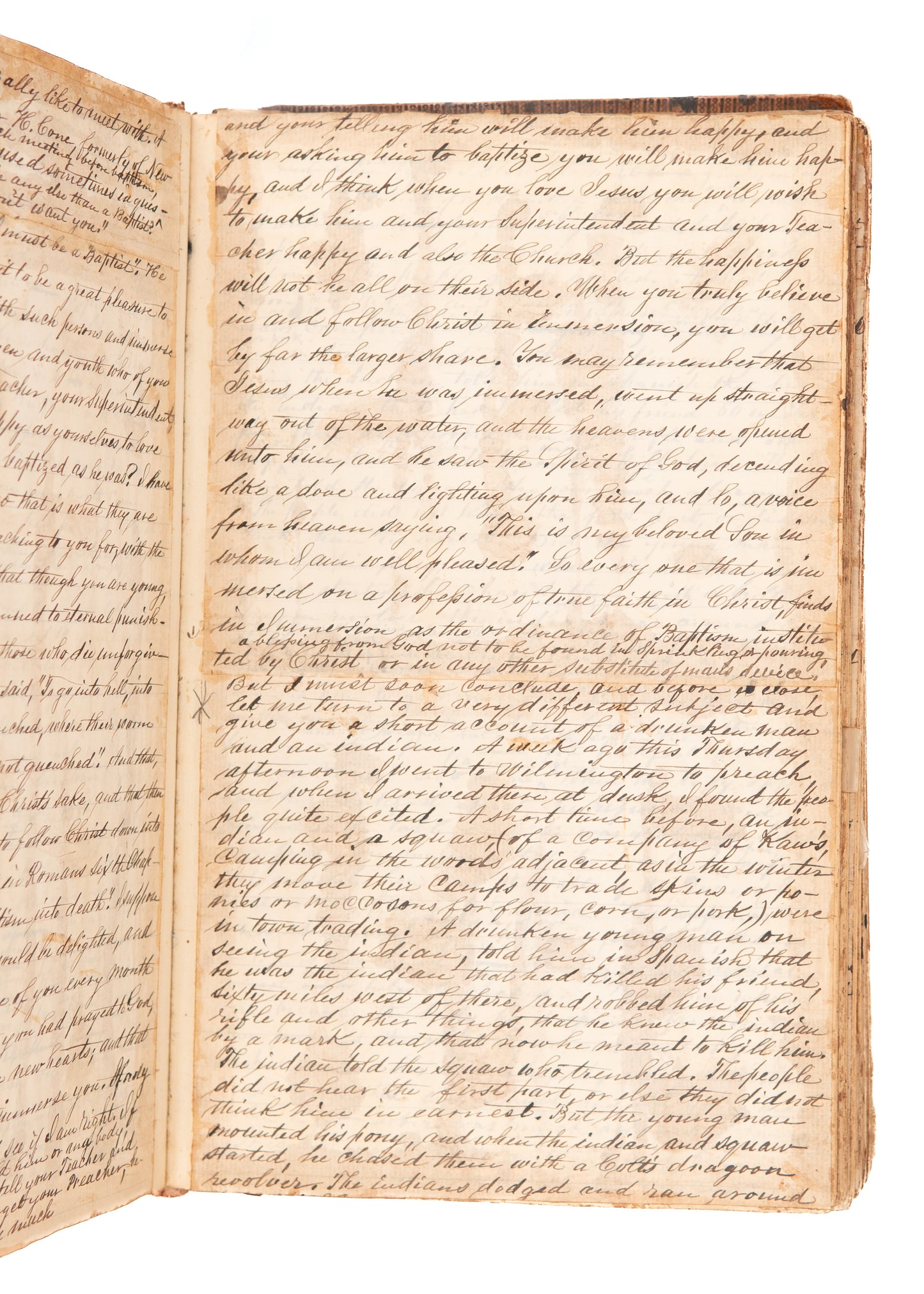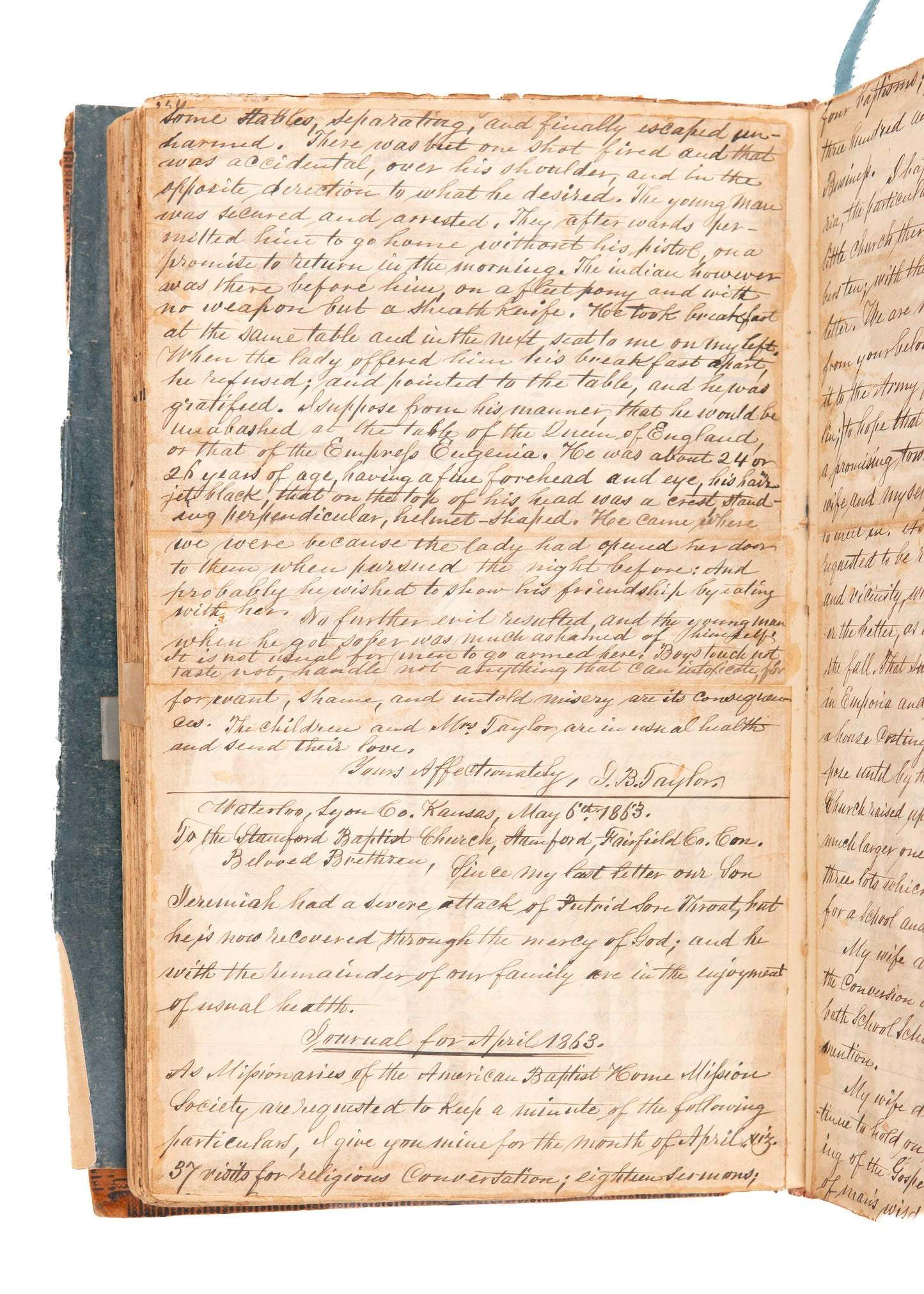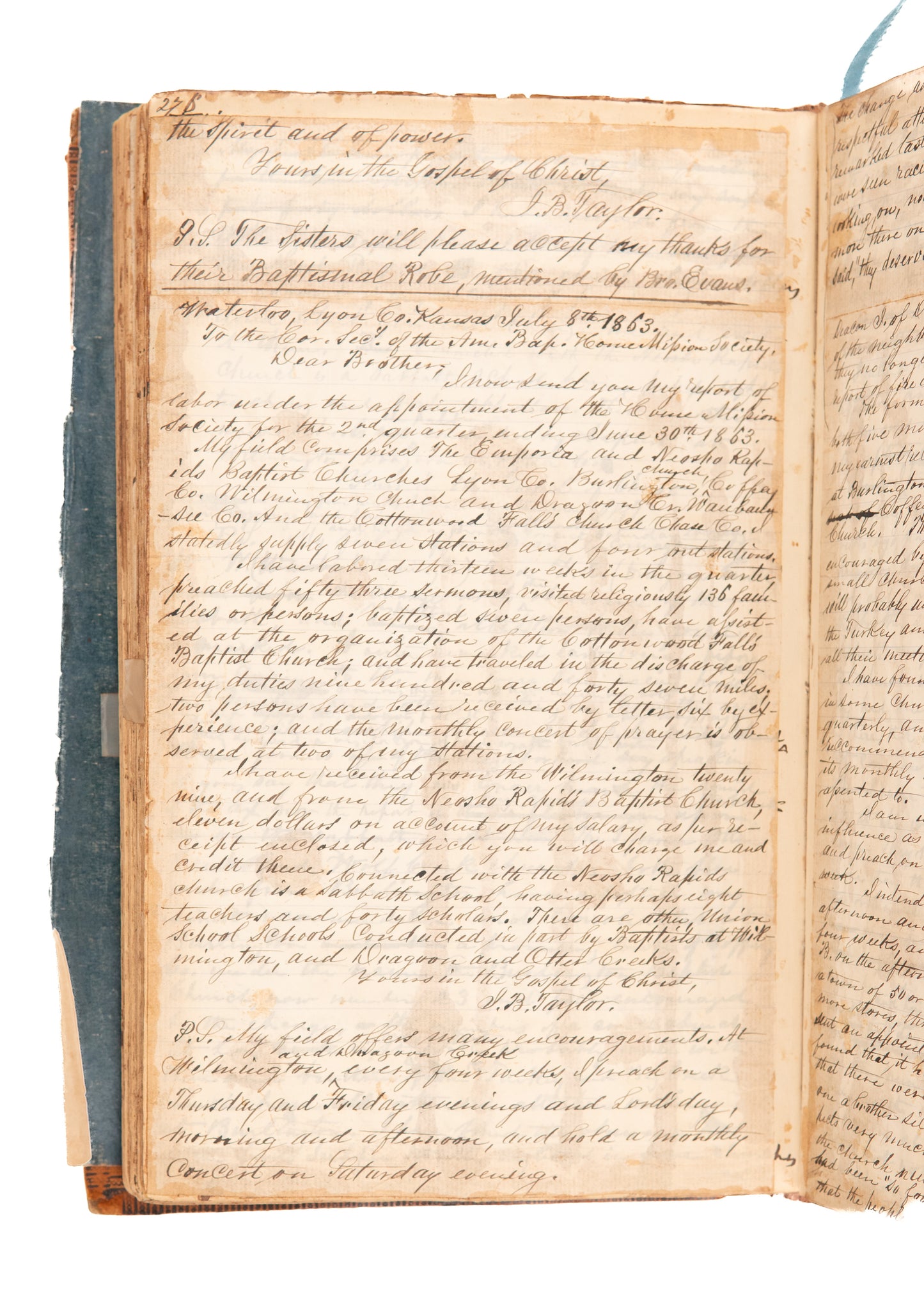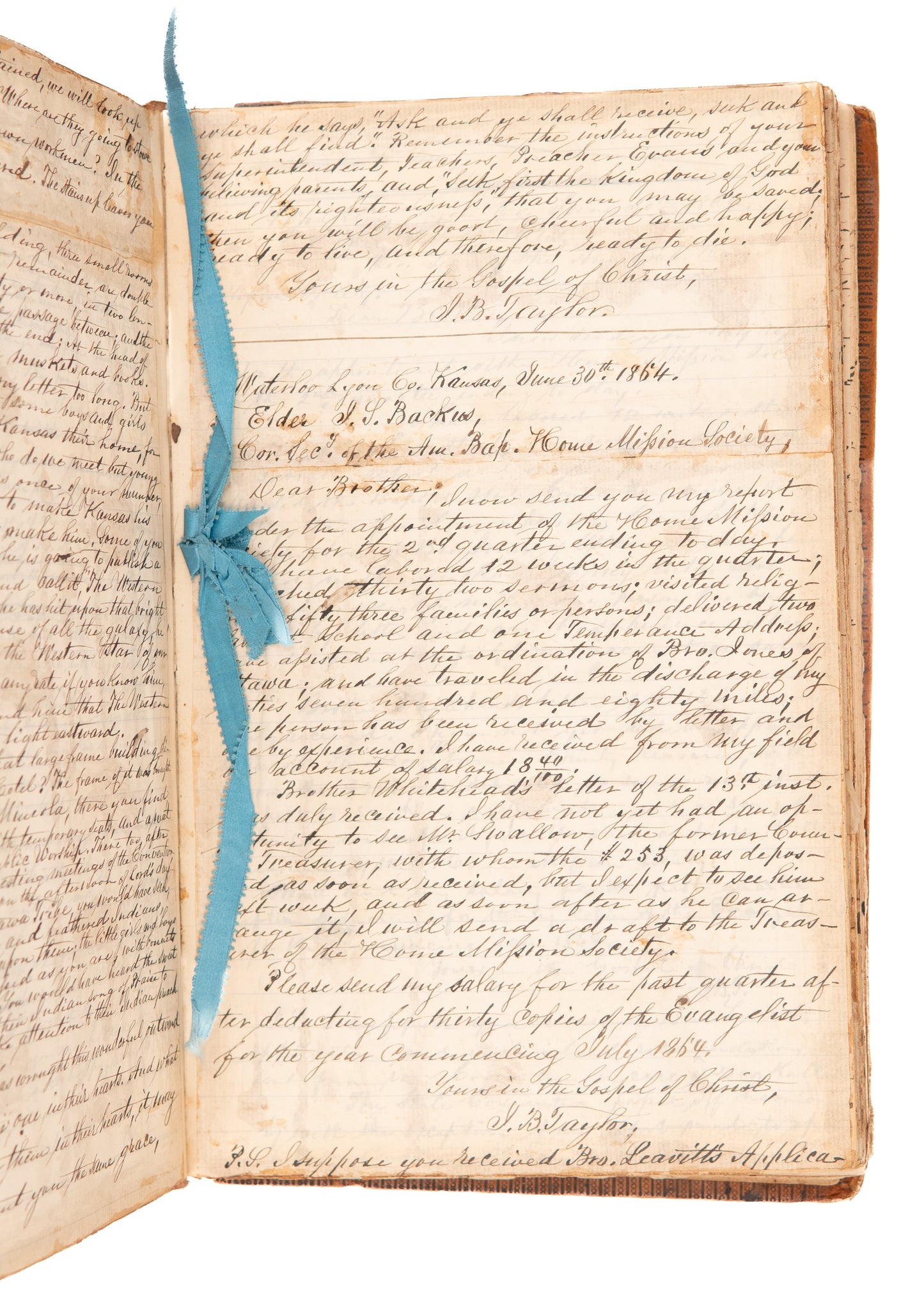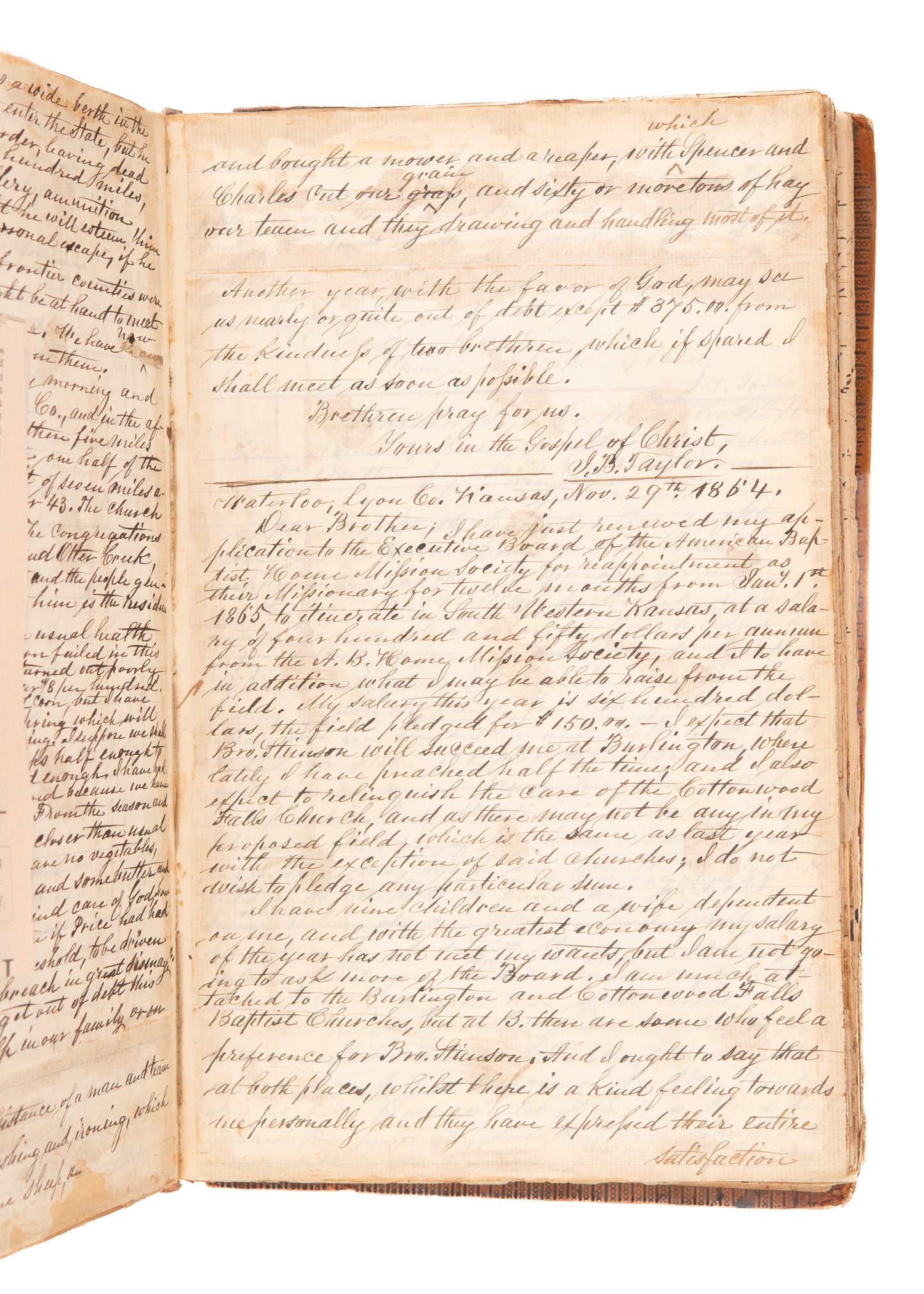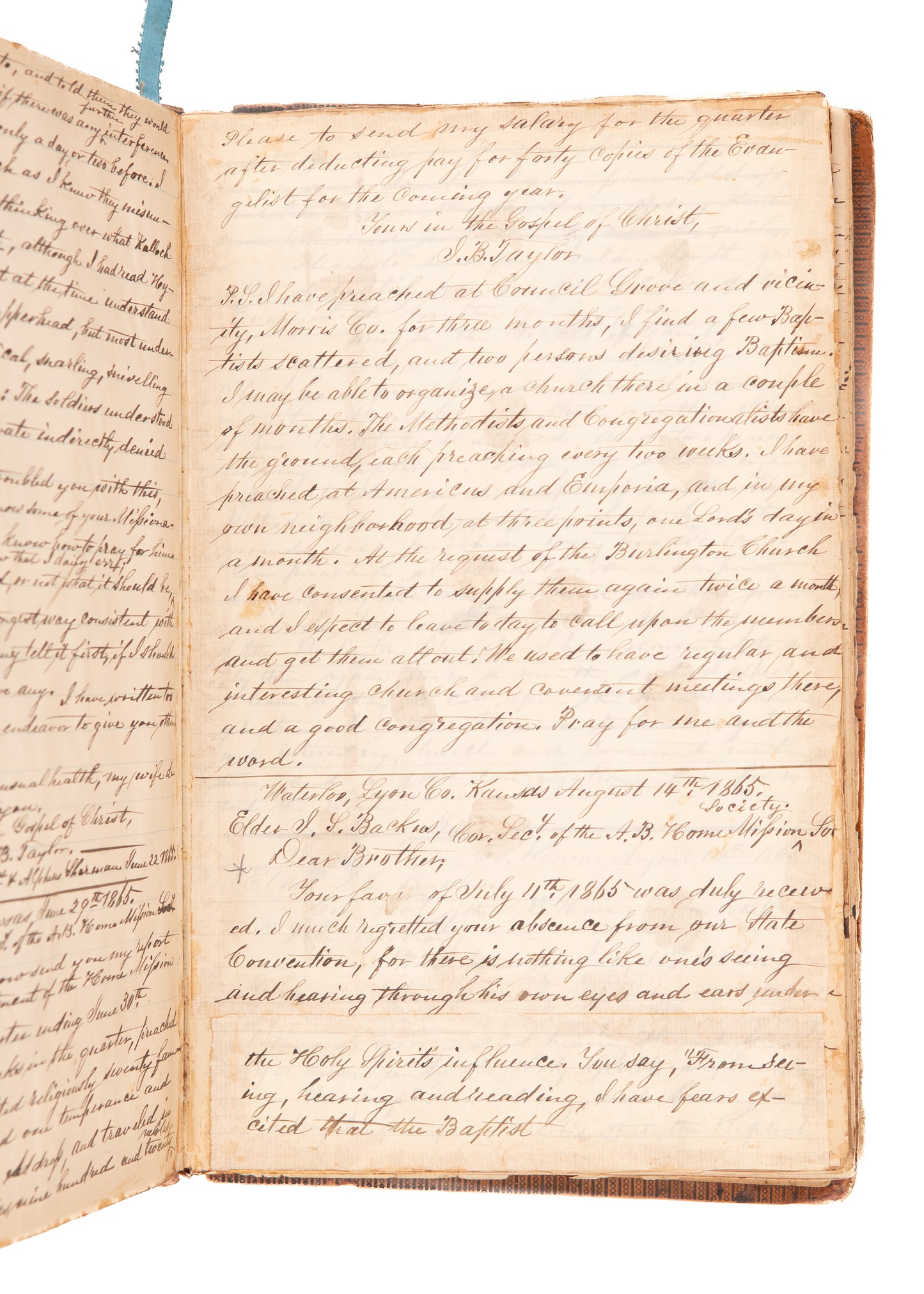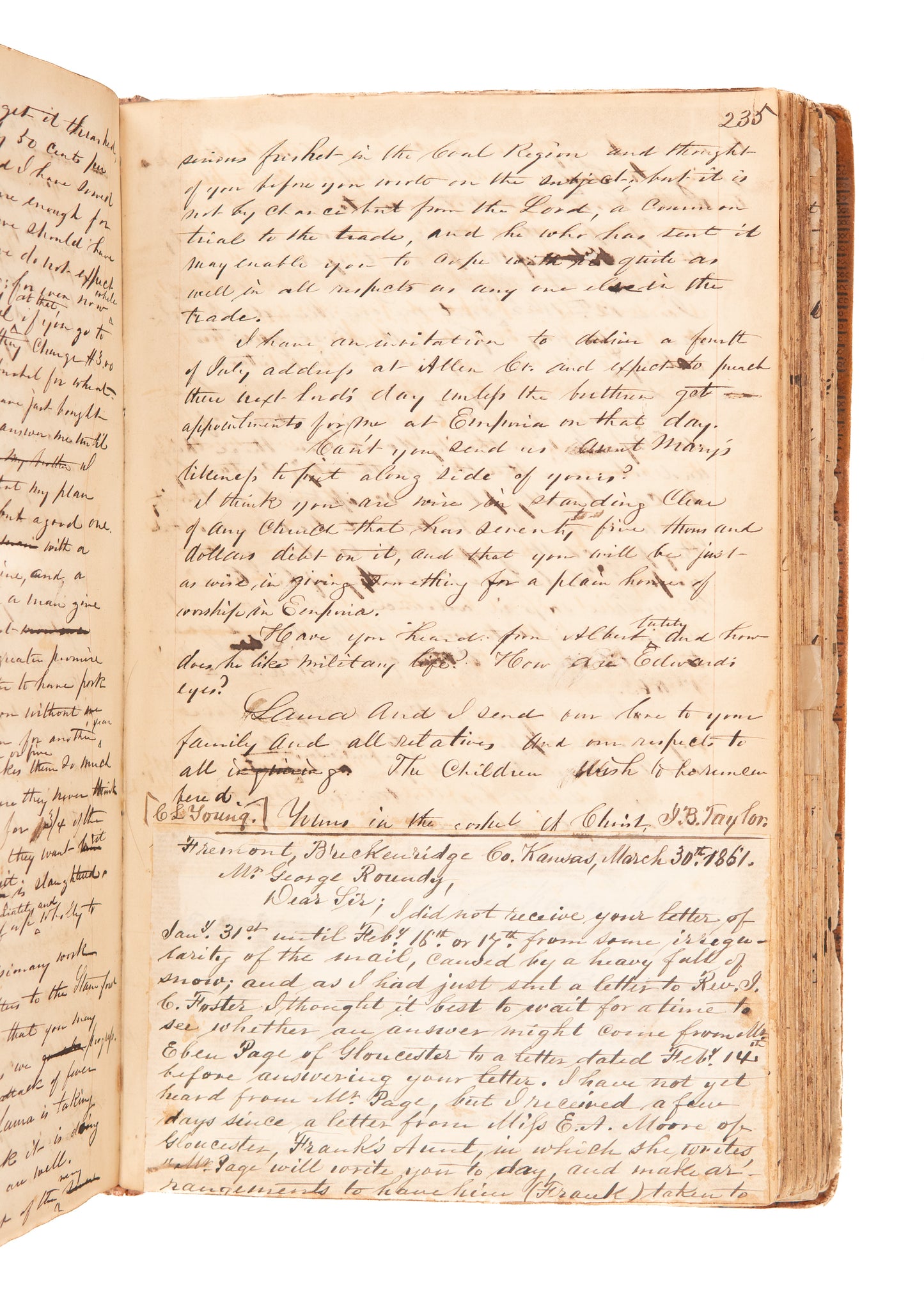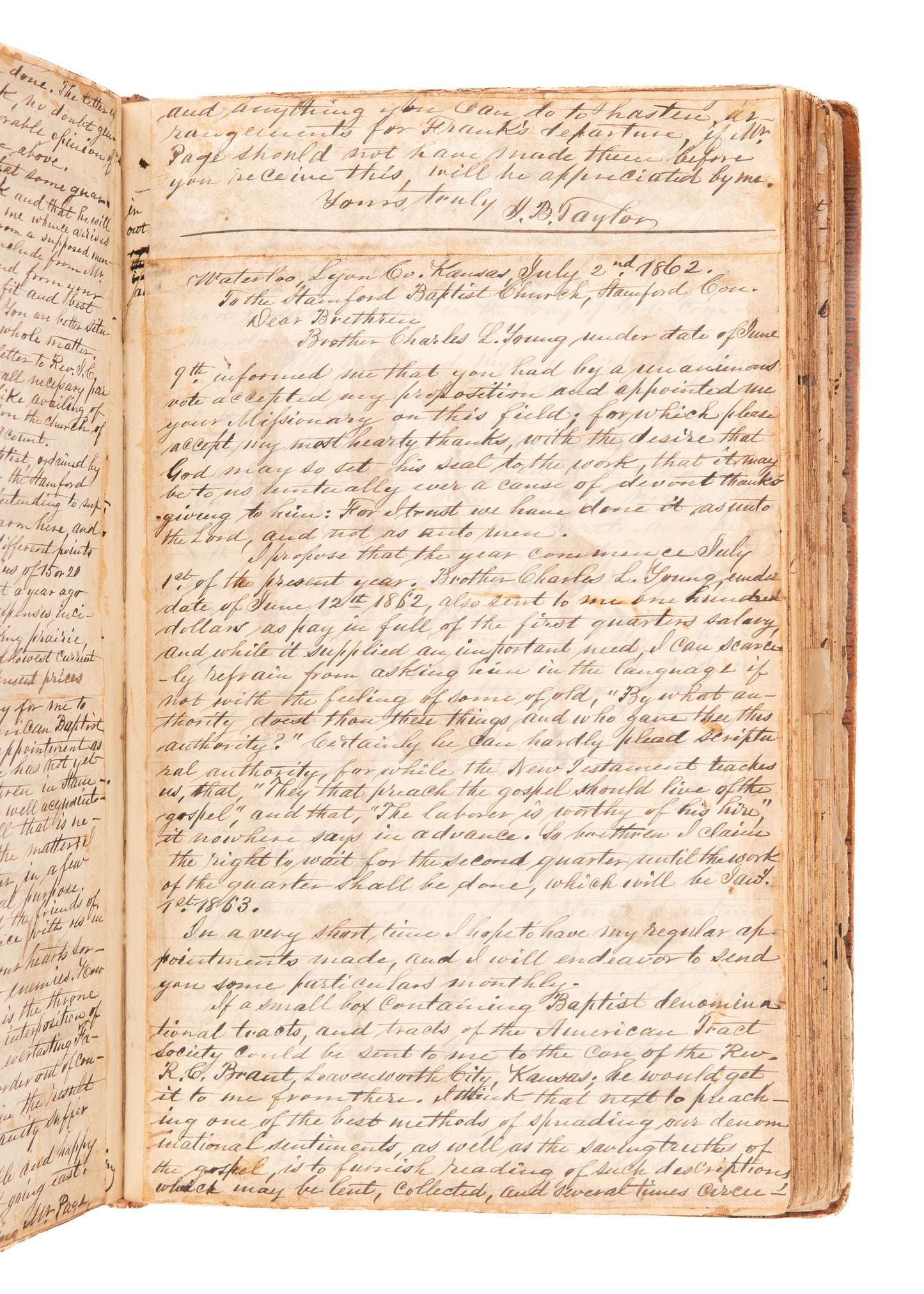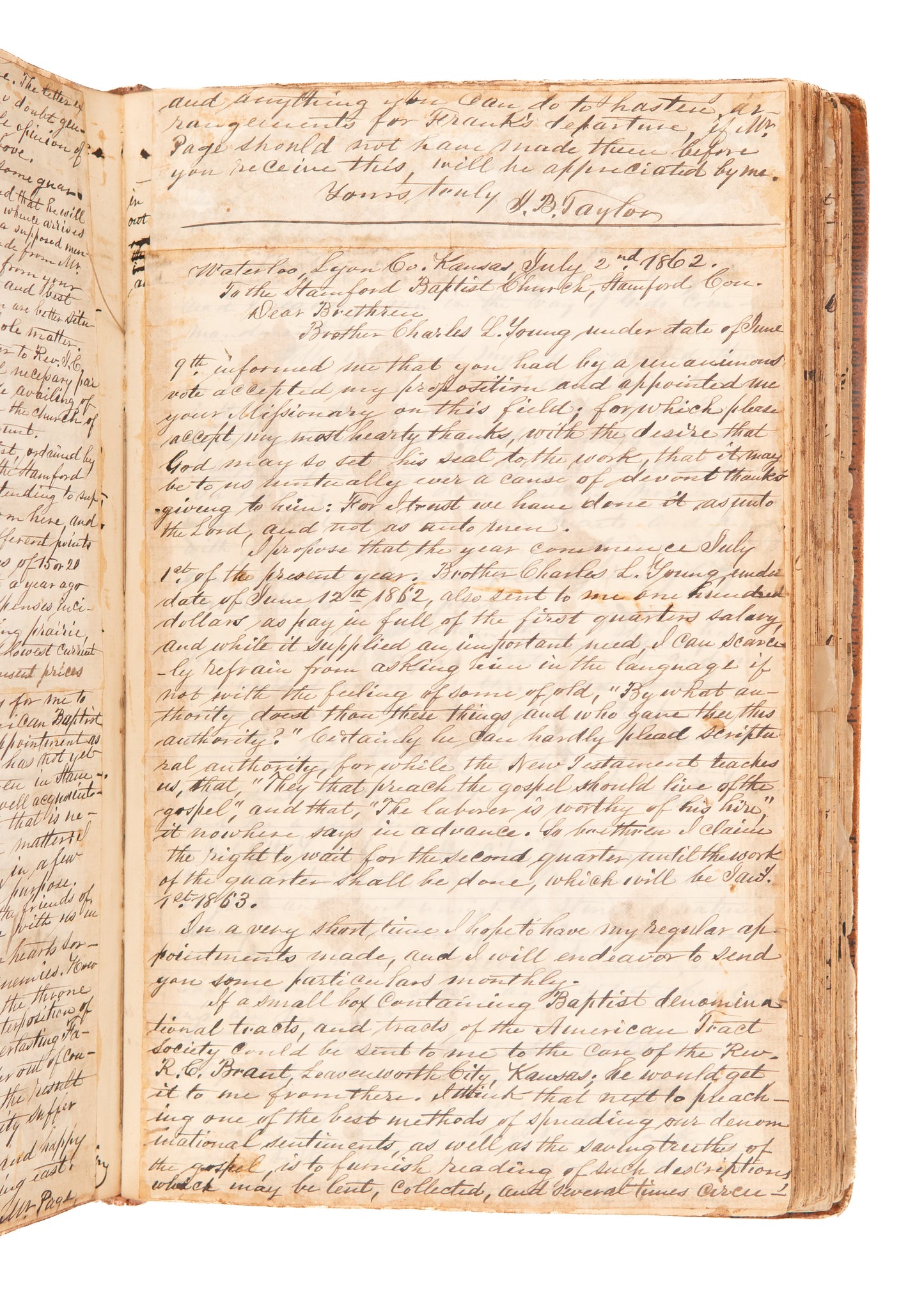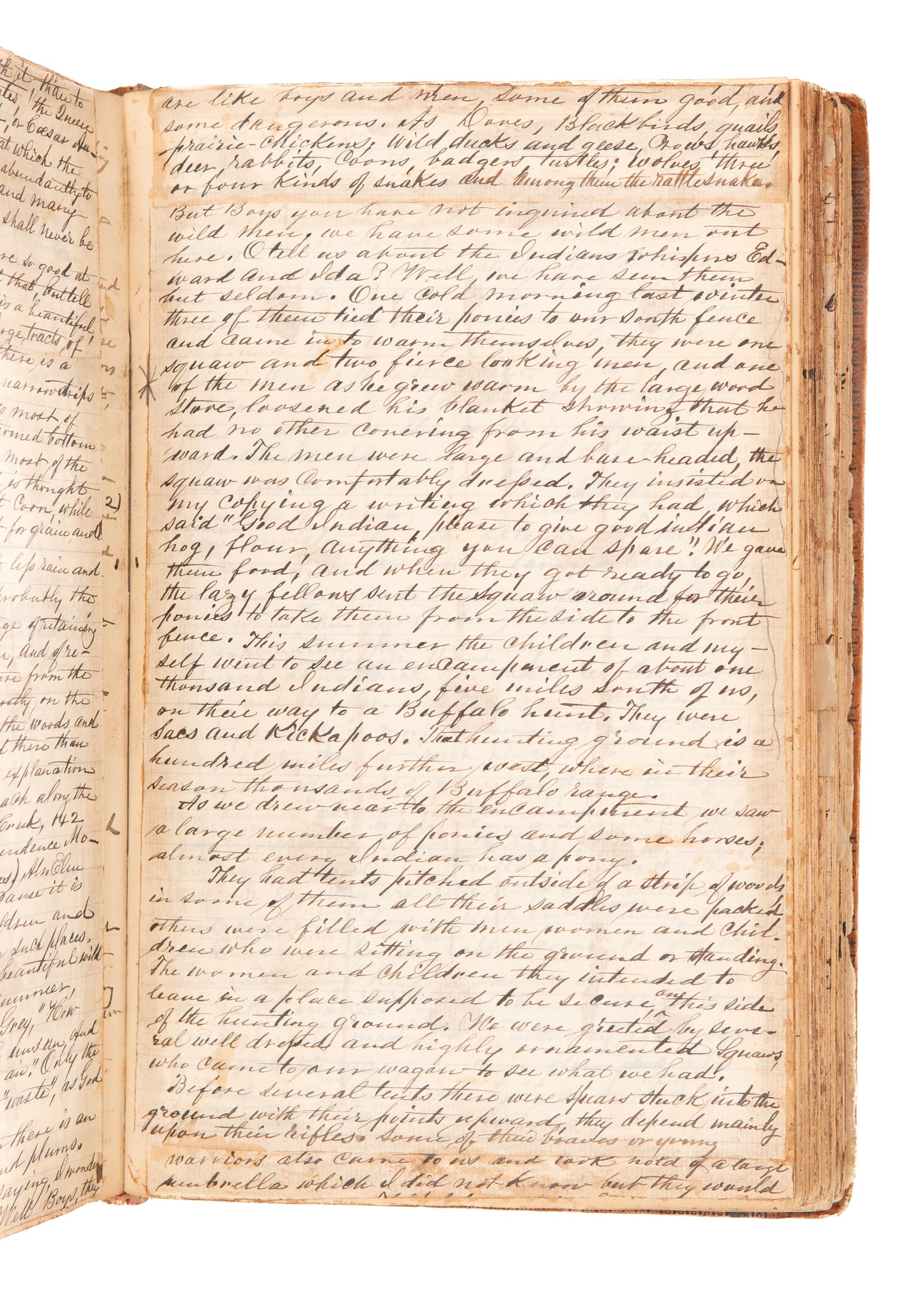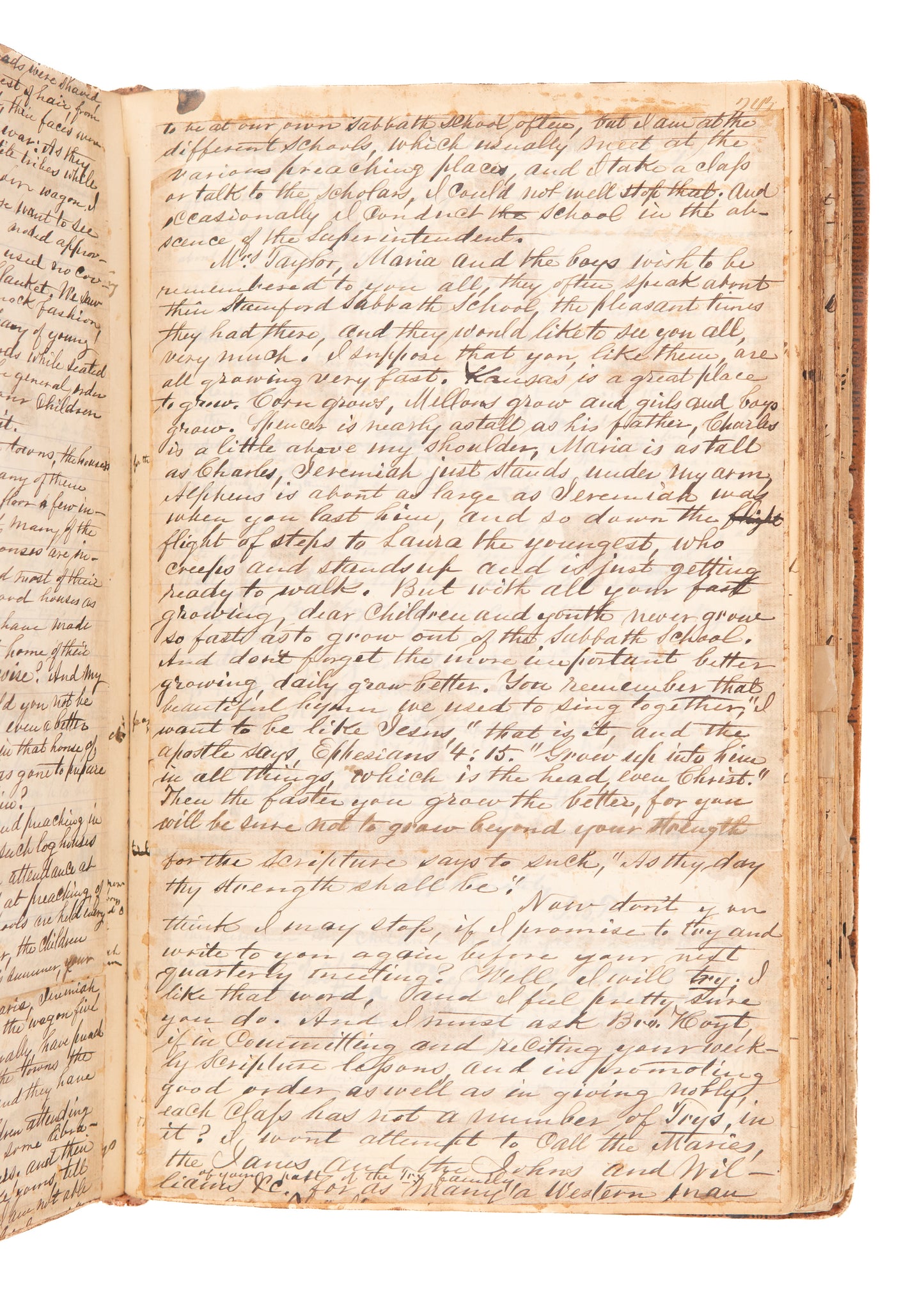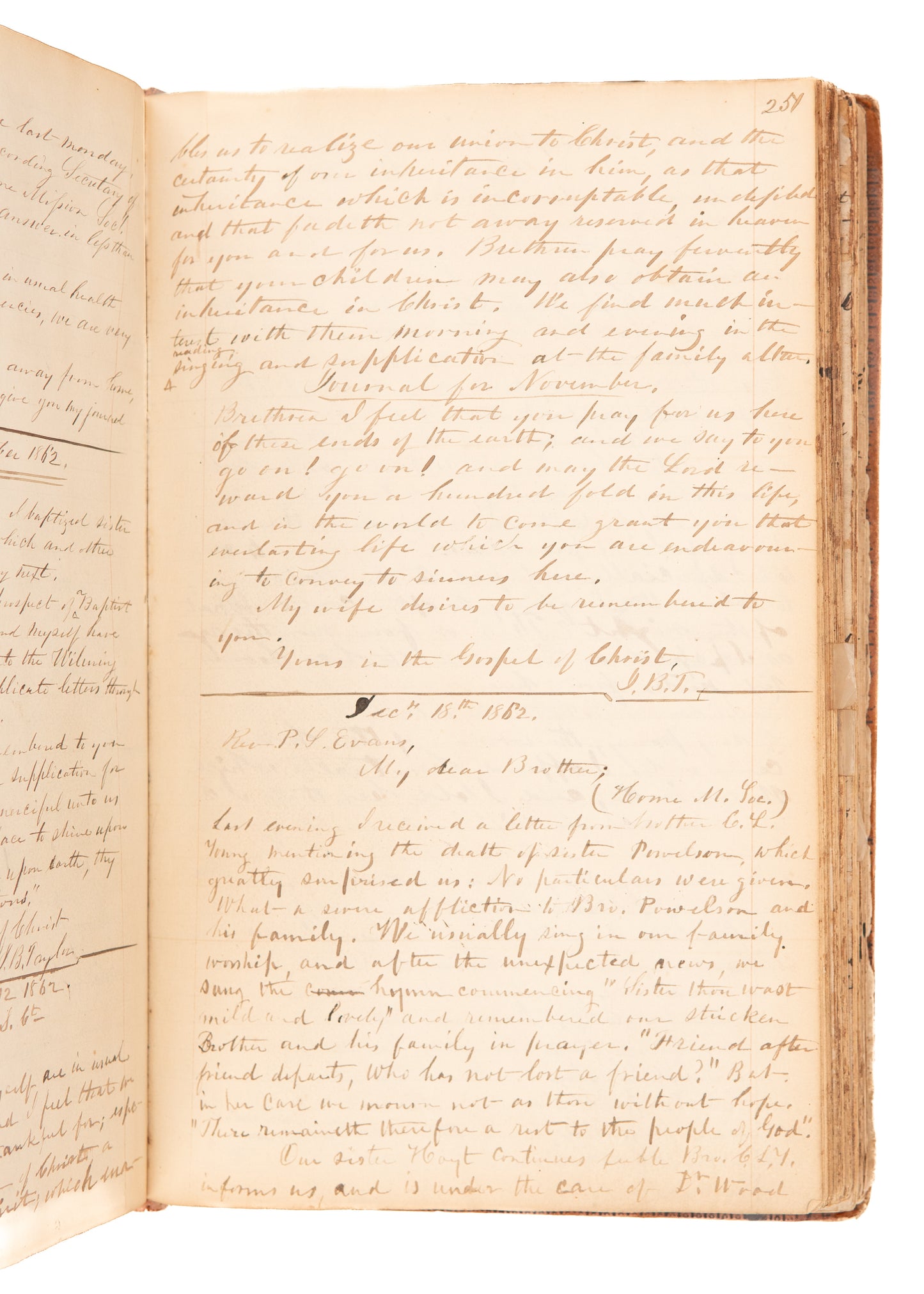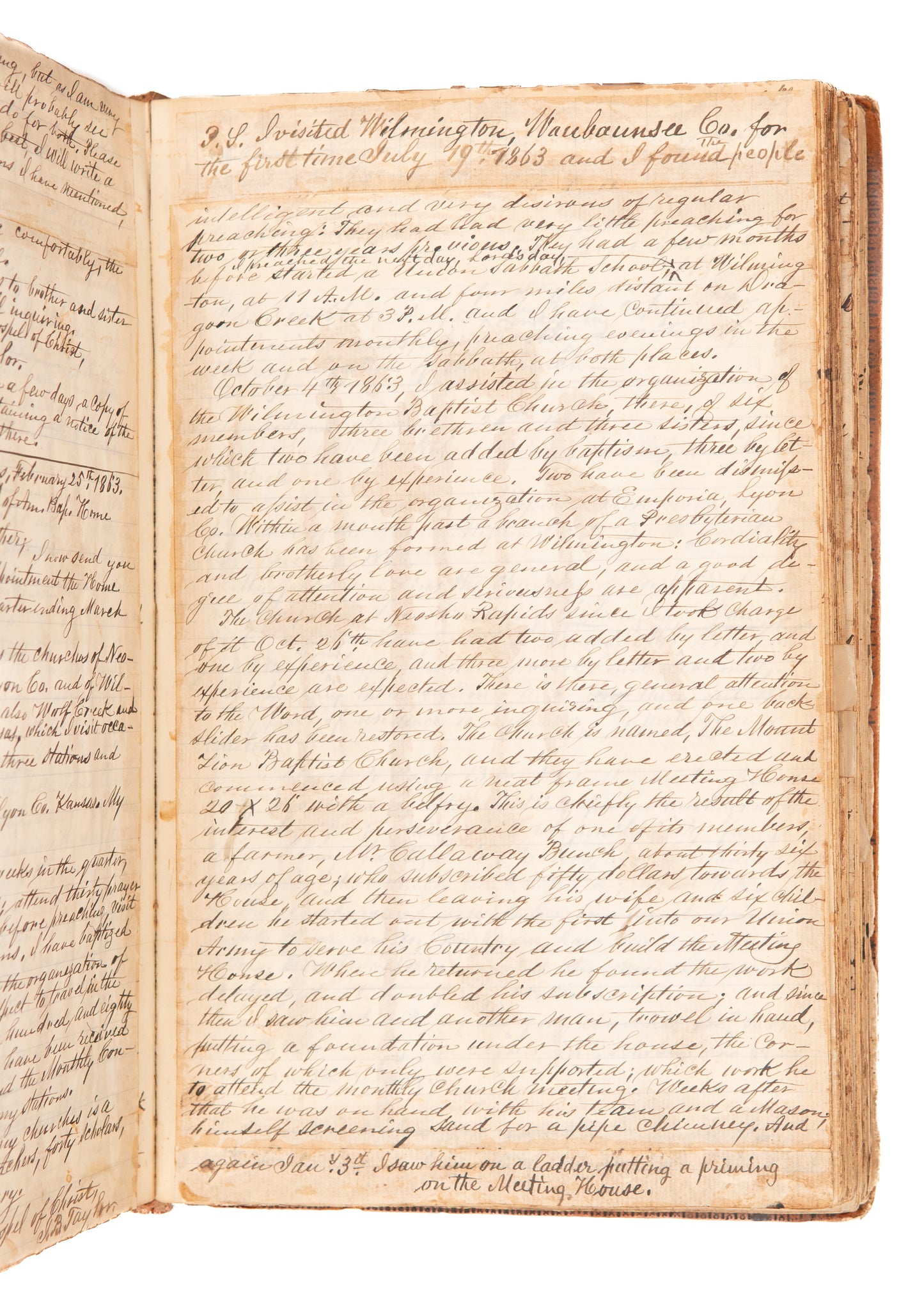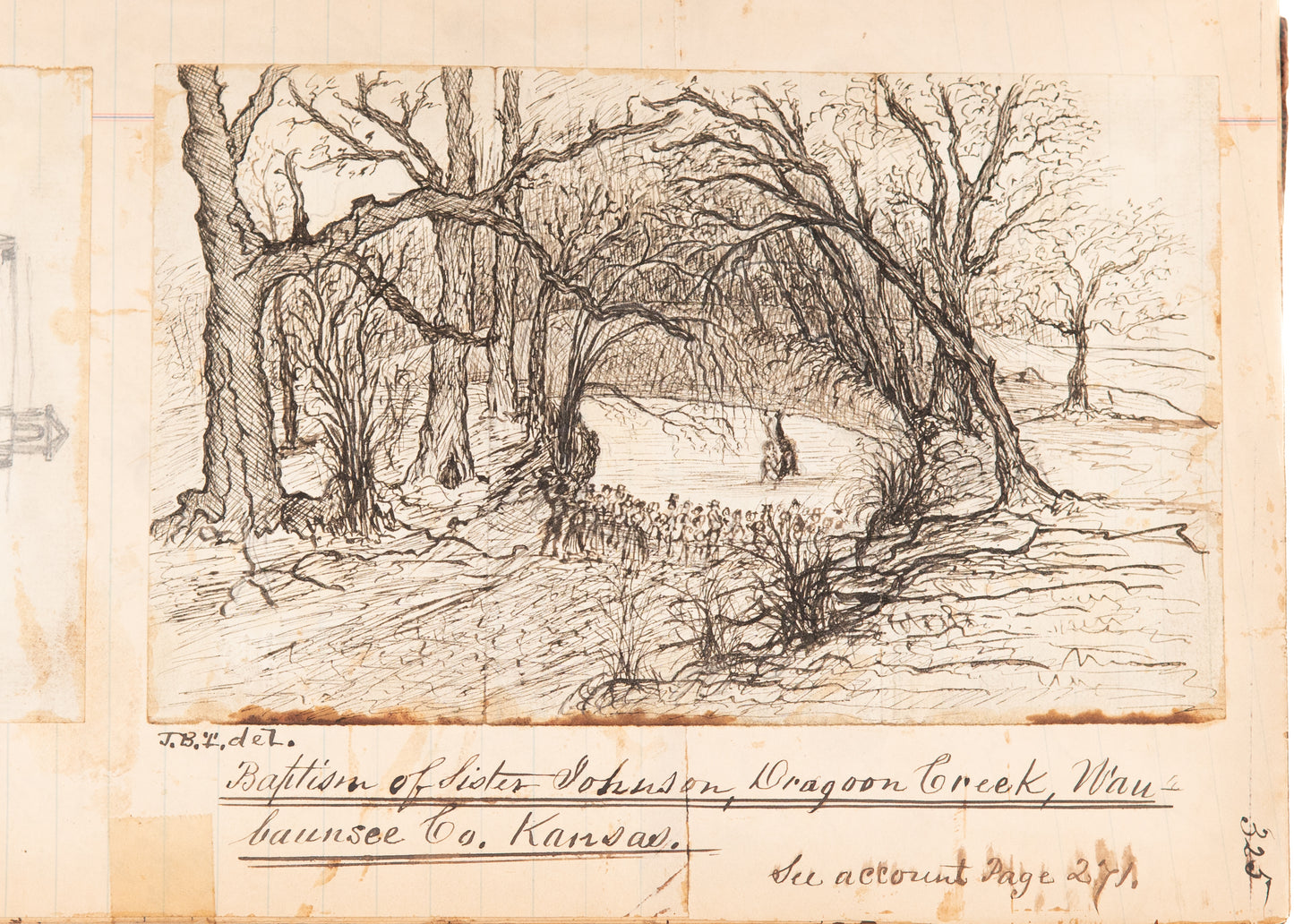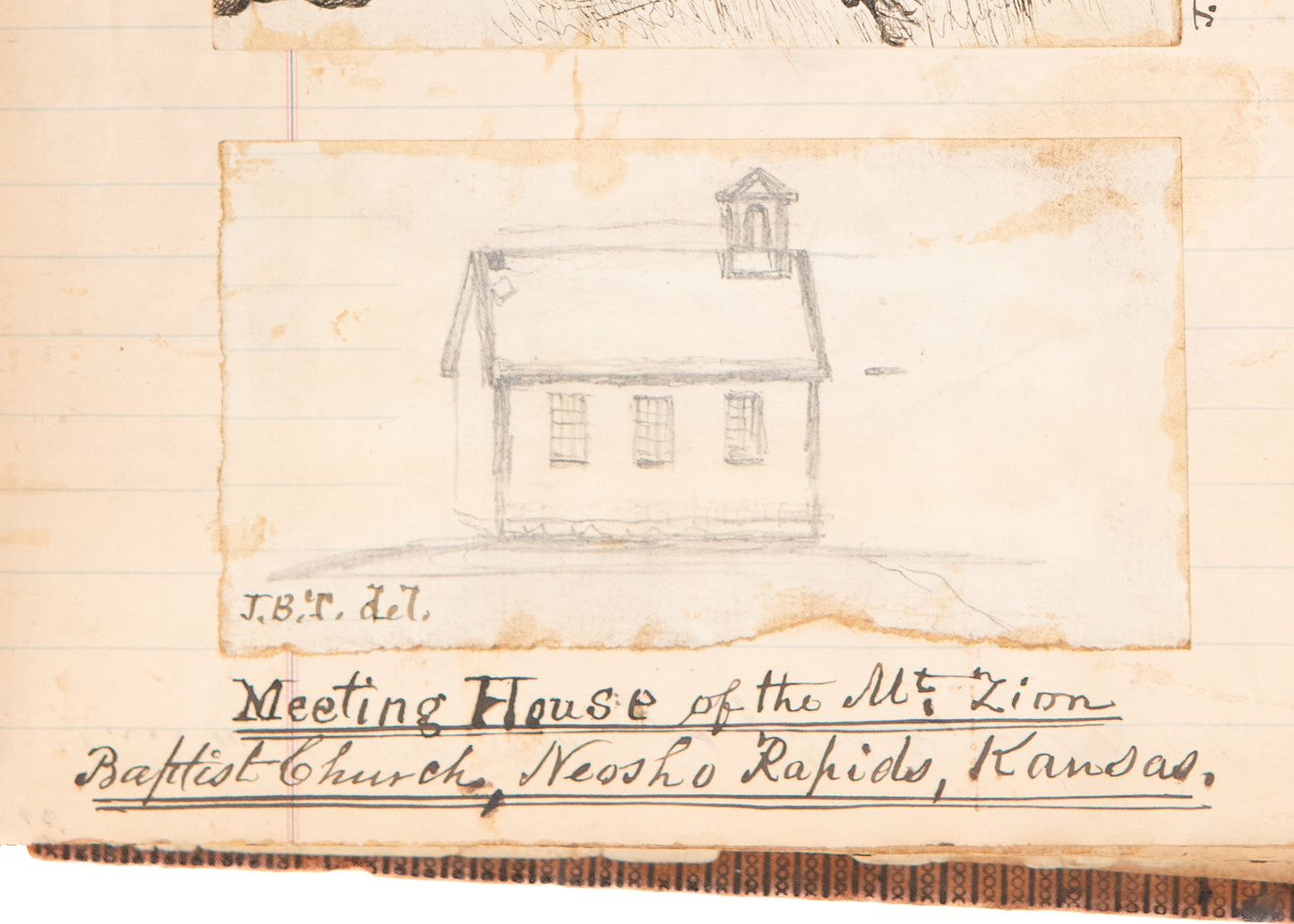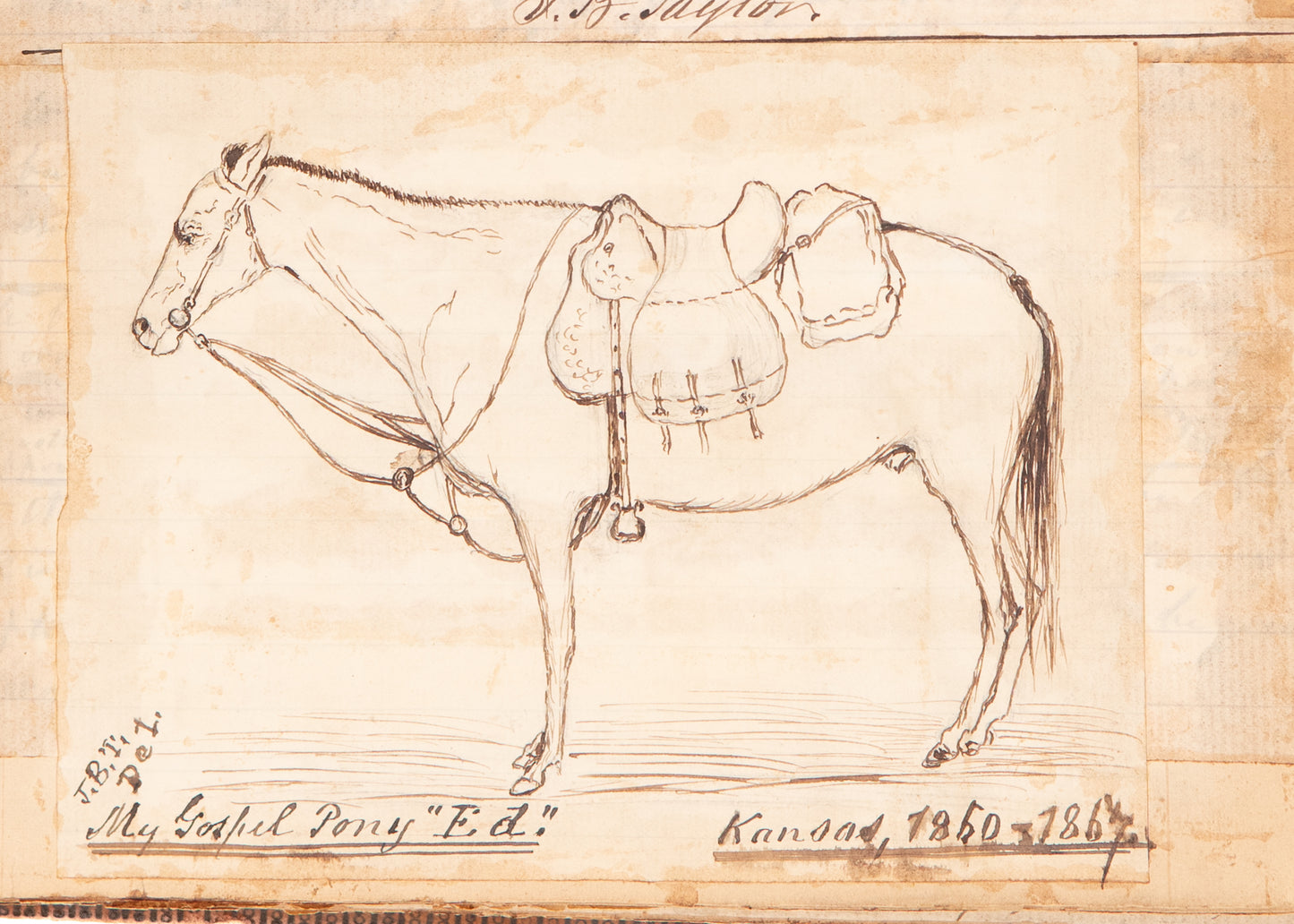Specs Fine Books
1861-1865 BLEEDING KANSAS. 460pp MSs of Correspondence. Indian Reservations, Civil War, Slavery, &c.
1861-1865 BLEEDING KANSAS. 460pp MSs of Correspondence. Indian Reservations, Civil War, Slavery, &c.
Couldn't load pickup availability
The land is filled with mourning at the assassination of President Lincoln and Secretary Seward; when shall the atrocities of oppression cease, and the wickedness of the wicked come to an end? Our trust must be in God, he is a refuge, a present help in trouble, therefore will we not fear. To Him that is able to bring light in darkness, and over-rule evil for good; who sometimes hides himself in clouds, and thick darkness, let us commit our Government and Nation.
************************
Let us rejoice together in thanksgiving to God for the return of peace to our Nation, and for all the wonders God has wrought in delivering from bondage the millions who were enslaved. It is the Lord's doing and marvelous in our eyes. The colored children, instead of being sold and separated from their parents, never to see them again, to spend their days in ignorance, sin, and misery; will now have the blessings of home and liberty . . .
An absolutely exceptional 460pp manuscript containing hundreds of original authorial holographs of content-rich correspondence composed by Baptist Missionary - Circuit Preacher to Kansas during the Civil War, Rev. Jeremiah Brower Taylor [1817-1893].
Taylor was originally a New York City coal merchant from Stamford, Connecticut, who had earlier in his life attended Hamilton Literary & Theological Seminary and graduated from the University of the City of New York in 1848. Although licensed to preach by a New York Baptist church, he continued in his business until 1860. In that year he sensed a call to Baptist missionary in Kansas among the expanding population, Native American Tribes, and sheltered "colored" population.
After conducting an exploratory visit to that state, he purchased land and returned to Stamford to sell his house and prepare to move West with his family. On September 26, 1860 he was publicly set apart and ordained to the work of an Evangelist by a regular council of churches, in the Stamford Baptist Church.
It seems as though the process of construction was that Taylor began copying his outgoing correspondence into the book to provide record of his letters, i.e. an old school "sent email" folder. Then, for some unknown reason, he re-copied some of them during the 1880's and laid them over his "original" holographs. Perhaps the ink was faded or similar and he wanted to preserve them. The result is that what we have now is a mixture of the original holographs, presumably from the time of mailing, and slightly later holographs, also in Taylor's hand, laid over the original holographs. At many points, the underlying text is visible. It appears in all points identical to the later holographs Taylor laid over them.
The letters contain occasional revisions, as though they were thought to have been prepared for publication at some point.
The volume itself measures 8 x 12.5 inches and contains c.460 pages with an average of 320 words per page, thus between 140,000 and 150,000 words total.
Pages 1-85 were used as a long form commonplace book, though not without interest. In these pages, Taylor records lengthy contemporary items related to largely related to Italy's capture of Rome and the final unification of Italy.
The remaining 375 pages, or 120,000 words, are nearly all dense, content rich correspondence, broken up by a few original drawings in the hand of Jeremiah B. Taylor.
Preceding the first letter are several inscriptions dated to Hamilton [College] February 24, 1840. They appear to be in perhaps Burmese and Chinese.
The first section of letters belong to his days sensing a call to be a minister of the Gospel, as missionary to Burmah, and his time at Hamilton Literary & Theological Seminary. The initial dates to 1839 and is addressed to Elder Martin. It is deeply spiritual, reflective of the heightened missionary zeal in the wake of the Second great Awakening. Over the course of 3 lengthy pages, he confesses his sinfulness, the love of Jesus, his zeal to see the world converted to Christ, and thus wishes to attend Hamilton to prepare as a missionary.
Subsequent letters are addressed to his brother, Elder Joseph R. Page, Elder A. W. Sunderlin [multiple, Sunderlin of the Steuben Baptist Association], Andrew Wheeler, Mr. William Chapin [Superintendent of the Blind Institute, apparently a childhood friend whom he attempts to see converted to Christ and to see his work with the blind made a missionary effort as well], Rev. S. H. Cone [Taylor's pastor], G. W. Savage, Charles L. Young, J. B. Hotchkiss, Youth Burman Bible Society, A. S. Hill, a particularly lengthy letter on the Doctrine of Particular Atonement, Mentions of Elder Jacob Knapp [who he apparently knows personally] with a first-hand account of a Baptist revival under his ministry, Calvin Stowe at Andover [mention], accounts of Taylor's preaching in New York City to hundreds , etc.,
This section ends at page 189, is deeply spiritual and worthy of publication as an example of Second Great Awakening piety among the Particular Baptists with many mentions of the who's who of the movement at the time.
The volume then abruptly shifts to correspondence from 1860 to 1866 from the Kansas Territory. This important historic correspondence makes up nearly the entire remainder of the volume.
He begins preaching missions at Dow Creek, Duck Creek, Euphoria, Burlingame, and various Indian Reservations.
Letters discuss his preaching and the general hardships of missionary / settler life.
"Attendance and attention have been good, with the exception [of the absence[ of some of the young men, who have gone to war a good warfare for the Stars and Stripes; may the Most High bless them and all the hosts which are engaged in our holy cause, to the utter confusion and annihilation of treason; and also lead our youth to the better warfare under Christ as the Captain of Salvation . . . "
"We have had no help of any kind about us for ever three months, and I and the boys dressed three hogs, I having killed them; we have attend to the stock and I have chipped our wood and drawn it three miles, mostly up hill with the horse and pony. In the house we made the work as light as possible and we have helped Laura and Maria, but Lama has been able to do scarce any sewing or mending so that quite a supply of dry goods that I brought with us remain untouched. Laura has been troubled with many pains of body, is very easily overdone, which we try to prevent, and yet I think her health is no worse than in Stamford, perhaps a trifle better. We have not been able to get our wheat threshed yet. I have sold a Colt revolver at $20.00, to be paid the 1st of may and am to take it in corn."
"Since the first settlement persons teaming and away from home, have frequently disregarded the sabbath and lightly excused themselves. Some have come West to cast off restraint, so that from restlessness, privations, and bad principles at large, the preacher of the Gospel of Christ has more than usual difficulties and needs. I suppose there are distinctive features of Western life generally. There is a good degree of intelligence generally diffused here, and many good people, but religion seems to be more on the surface, not the still deep current of personal daily piety which we more frequently witness in the East. Here even preachers leave their preaching to be candidates, and when successful, to fill the duties of legislators.
I was quite pressed this fall to permit myself to be nominated for the legislature, but I told them NO! Paul said this one thing I do. You have plenty of honest and capable men without trenching on the Gospel and making ministers more worldly minded."
Account of an Indian Service and Appropriation of Indian Lands for "Native Schools."
Bro. Jones was ordained as an Evangelist. He was of the Potawatomi tribe, but he has been with the Ottawas some years and he has preached for the Ottawas and occasionally for other tribes. The Ottawa Indian Baptist Church numbers about sixty and the whole tribe two hundred and ten. That church had on the Lord's day a service in their language, at which Bro. Jones and an Indian Bro by the name of Wind spoke. Their first hymn was in English, their last in the Ottawa tongue. The village of Ottawa has been commenced within two months, and it has already four or five buildings, and several others begun.
As the tribe may be called a Baptist tribe, so this is intended to be a Baptist town, and region, and certainly the plan appears to be practicable and very desirable and the effort promising. There is also a baptist Church of white membership there. The Ottawas, through the United States, have devoted 20,000 acres of land, for a school, Academy, and College. This land has been selected from their woodland as the most valuable. Already 5,000 acres of the 20,000 have been sold and proceeds are designed for an Indian School Building, the cornerstone of which was laid during the Convention [Baptist]. The site for the School and College Buildings is well selected, moderately high, and beautiful. The Trustees are all Baptists with the point to appoint their successors. The project is one of great importance to our Denomination. . . .
The Ottawa Indian "Village" a Yankee-Indian Town Hardened against Guerrilla Incursions.
. . .the ladies prepare to sleep in the covered wagon, while blankets and buffalo robe are spread on the prairie, near the wagon, for the men, and buffalo robes cover us. And I at length sleep soundly with my hat partly on my head, and my saddle bags as my pillow. We are awake and off by sunrise. We pass through the New Agency of the Sacs and Foxes, and take breakfast in the woods beyond. We had strayed seven miles the night before. After breakfast we start pass some farms, well cultivated by the Chippewas, and arrive at Ottawa before noon. There you find a large building, which was intended originally for a barn, but which at present is the Ottawa Hotel. the din of tools, and the general stir gives as your first impression, that this is a live town. The first and second stories are lined, in part, with timber so as to be bullet proof. They are pierced in military style for defense. There is a good supply of muskets and revolvers in the house, and in front a liberty pole, with the Star Spangled Banner flying gaily at its head. The cause of this preparation is that Ottawa, being twenty or twenty five miles south of Lawrence, in the even tof a raid or the incursion of guerrillas, it might be in their course.
Significantly, we have substantive letters on Indian life and on the ongoing outbreaks of violence in Kansas, including in and near Lawrence.
The past month [October, 1864] here has been one of unusual interest from the movements of the rebel General Price, the proclamation of Military Law, and a general call to the Military of the State, a few frontier counties excepted. And never was a call more heartily or promptly responded to. Immediately on the receipt of the call, all were ordered out, and no excuses taken except in the extreme cases. I met a Subordinate going from house on the prairie at ten P.M. to warn all liable to Military Duty to meet at the rendezvous at 10 A.M. the next day. On the afternoon of that day I saw a mounted squad hunting up delinquents, intending to take any by force if necessary. One German farmer returning from mill, they hurried, and went home with him to make sure of him. Another one they compelled at last at half hour's notice to go, leaving his fences down, after his request to the blacksmith, who was a discharged soldier, to look after them followed. And they officer complained to them that he had to ride twenty five miles for their negligence and then expected to ride all night. Preachers under 45 were not excused and in some counties all citizens under 60, black and white, went. In Three or four days afte rthe Call was known in the different parts of the State, the Men of Kansas, numbering over 20,000, were on the border at Kansas City and Paoli. On my way to Burlington to preach, I passed through Ottumwa, a place of 20 or more houses, I found the stores closed and but two men in the place, the Miller and the Post Master, the latter a man over 60. Two teams, driven by women, were at the Mill for flour. So it was all over Kansas. Some, whose age and infirmities excused them, were detailed to keep the women in firewood.
Price was greatly surprised and would not believe his own men when they told him the array of the Kansas Militia. Price's men, who were taken or came in with prisoners, said that it seemed that every cornstalk and tree was turned to a man. Price had told the rebels of Missouri that there was scarcely anything in Kansas but women and children, and that if they would join him and lay waste Kansas, they should have horses and cattle and sheep in abundance. Marmaduke has said that their place was to recruit in Missouri, then desolate Kansas, and then return and winter at Springfield, Missouri, in the hope of McClelland's election, and a speedy acknowledgment of the self-styled Southern Confederacy, when they would claim Missouri and Kansas! All very pleasing to them in theory, but rather difficult in practice. General Marmaduke wept the day after his capture, when he saw his men passing on their way to confinement, and said, "Boys, I would give fifty thousand dollars to fight that battle over again." Price was very near him when he was captured, and just escaped. He will probably give Kansas a wide berth in the future.He was not permitted to enter the State, but he was fought all along the border, leaving dead rebels strewed more than a hundred miles, with the loss of all his artillery, ammunition, trains and cattle.
A four page exceptional description of the Sac and Fox Indian Reservation.
The quality of content exampled by following account of J. B. Taylor’s visit to the Sac [Sauk] & Foxes Reservation in Kansas [1863]. The reservation occupied a tract of land on the headwaters of the Osage River 20 x 30 miles square, bounded on the north by the Shawnee Reservation, on the east by the Chippeway and Ottawa Reservations, with the Osage Indians some distance south and the Kaws west at Council Grove.
During one of Taylor's visit to the Reservation, he was introduced to Chief Keokuk Jr. and to Henry Woodson Martin (1817-1901), who had been appointed the Indian Agent for the Sac & Fox Tribes on October 1862 by President Abraham Lincoln.
4pp MSs Account from the Present Correspondence
I left the road and took the Sac Trail through their Reserve and for twenty miles I did not see a farm or a human being. Indians here never travel afoot, The trail is for the most part four paths, three or four feet apart, made by the Indians on ponies by traveling abreast when the Sacs and Foxes go out on a Buffalo hunt. I had never been this way before and when I reached some of their scattered houses, considerable care was needed; once I missed my way in the woods and had to retrace my steps for a quarter of a mile, and then avail myself of the yankee privilege of guessing; and remembering the course I had come and knowing the point of my destination to be about east, I made for a trail on a distant hill, but was not certain that I was right until a half an hour before sunset when I came in sight of The New Agency, a mile off, in a beautiful valley.
There are very few white families in this settlement. Some of the Indians have farms under cultivation and comfortable houses. The first house I called at was an Indian’s and you may imagine my surprise, while pointing to a large white frame house and out buildings, I asked, “Who lives there?” when I received the reply, “Keokuk, an Indian Chief.” 1 I went on to the village and met a boy of whom I inquired whether there [were] any christians there? He pointed to the house of Mr. [Henry Woodson] Martin and said that he had heard that he was one. I went there and found Mrs. Martin watering some flowers in front of the house. I also found Mr. Martin and introduced myself as a preacher on my way to Paoli; that I had thought that probably they seldom had preaching and that I had therefore made it in my way to spend the sabbath with them if they wished. He inquired my denomination, said they had a Missionary and preaching regularly, but that their preacher was then absent and invited me to his house. I unexpectedly found him to be the Indian Agent, a gentleman, and a member of the Methodist denomination. He had notice given and I preached in the Mission premises at 11 a.m. and 4 p.m. The congregation were from 30 to 40, half of which number were Indian orphan children who have been taught to read and write. There were also a Lieutenant Long and two of his company; our Government had recently made a payment to this Tribe, through Mr. Martin, and this company came as an escort and remained a month.
The Sac and Fox Tribe numbers about 1,000, and receive $20 apiece semi-annually. But the Agent told me that they were always about six months in arrears so that their money usually goes right into the store keeper’s hands to pay previous indebtedness.
There are 25 orphan children in this Mission School, which is sustained in part by the annuities due the children, and partly by christian benevolence. This school was commenced by Mr. Martin, the present Indian Agent, under great opposition from the Tribe, as they had carefully remembered and followed Black Hawk’s advice, never to adopt any of the customs of the whites. In our worship the children united in singing, “Happy Day” and “I think when I read that sweet story of old.” There was one little girl there whose left arm had been twisted by the Indians lifting her up and down from the pony when quite young. The children were neatly dressed and seemed much attached to their teachers. God has thus made the loss of their parents a blessing to them. What a beautiful illustration of that verse, Ps. 27.10. “When my father and my mother forsake me, then the Lord will take me up.”
The Sac and Fox Indians have no negroes about them. One of the scholars at the school there said that God made the Indian first, and then the white man, and that Satan was standing by and said, I will make one man, and then made the Negro. This he had been taught by the Indians and it shows their strong prejudices. But the Creek Indians sometimes intermarry with the Negroes; as I saw in the evening when Mr. Martin took me five miles to fill an appointment I had made in the afternoon to preach to a Baptist Church of 20 or more [on] Refugee Creek—Indians and Negroes. There may have been 30 of them in all and some of the Colored brethren had Indian wives. They had a colored brother as preacher among them who interpreted to them [each] sentence as I preached. They sang in the Creek language, “Jesus I my cross have taken,” and “Come Holy Spirit, heavenly dove.” The occasion was one of interest to me, and evidently so to them. It reminded me of the pleasing fact, that God understand all languages, and that it is said of the happy throng in the heavenly world, Rev. 5:9 “And they sung a new song, saying Thou art worthy to take the book and to open the seals: for thou wast slain and hast redeemed us to God by the blood out of every kindred and tongue and people and nation.”
The Indians are very superstitious. A child died at this school two months since and some of the squaws that visited the child said they knew that there would be a death there, for that they had seen the Fireman there; that the Fireman would poison anyone. That it assumed different forms, sometimes that of a butterfly, therefore the children are taught to chase and kill butterflies; and the Indians held a solemn feast to drive off the Fireman. In this feast the dog is held sacred, on being killed and left for the Great Spirit, and another cooked but not with the other meals; and these Indians are considered most fortunate that get a taste of the dog.
When a husband dies, all his property goes to his near kinsman; the widow has nothing, and she is compelled to mourn at the pleasure of that kinsman. Mr. Martin told me that widows have been known to mourn five years. They black their faces and take no part in the dances. This mourning is terminated by someone presenting the widow with a gift, usually a pony. When one of their tribe does, one of their number addressed the dead body relative to the estimation the tribe have had of him, and as to the soul’s journey to another world; and frequently they send messages to those who have been dead some time telling them many things about their tribe that have happened since their death
They now tell their children at school that they must learn what the white man teaches and adopt his customs, as the white man is now going to rule, and the Great Spirit has something else for the Indian to do. He is taking them away so fast for some other purpose. When any one of their number becomes fatally diseased, he kills himself rather than suffer pain. Two cases were mentioned to me by the Agent—one, that of a man subject to epileptic fits who, as he saw the intervals lessening, after he came out of one of the fits, shot himself. Also Shaw paw kaw kof, the greatest orator of the Indian Tribes west, by whose influence alone Mr. Martin established his school, when he saw that consumption was fastened on him, made his will, disinheriting his son who was worthless and adopting a nephew, and then killed himself.
My family are in usual health. Pray for your Missionary and his family. Yours in the Gospel of Christ, — J. B. Taylor
Additional.
This just touches the surface. There is a substantive reflection on the assassination of Abraham Lincoln, observations on the status of freed slaves, extensive accounts of Baptist preaching, conversions, the baptism of converts, etc.
Additionally, the work is decorated with a small quantity of drawings executed by J. B. Taylor, including one of his Pony [provided by the children of Stamford Baptist Church], one of the new Baptist meeting house, and a superb ink example of Taylor performing a baptism outdoor, surrounded by crowds.
Share
